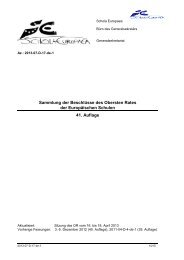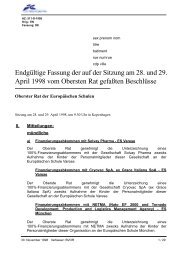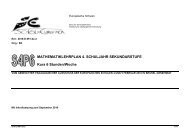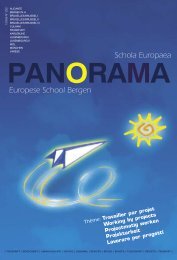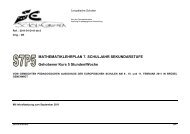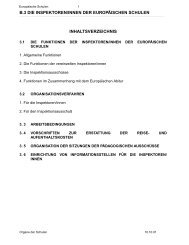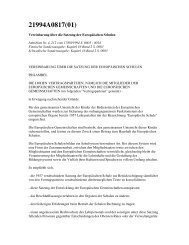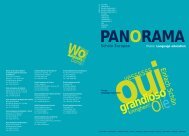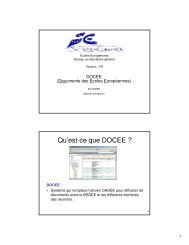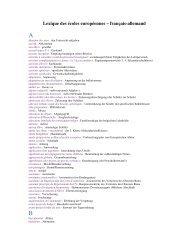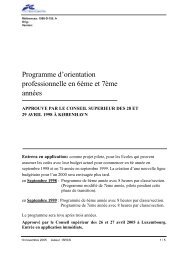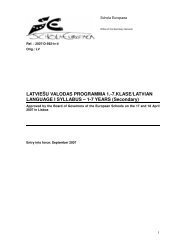External Evaluation of the European Baccalaureate (Annexes)
External Evaluation of the European Baccalaureate (Annexes)
External Evaluation of the European Baccalaureate (Annexes)
Create successful ePaper yourself
Turn your PDF publications into a flip-book with our unique Google optimized e-Paper software.
1.9.3 Doc 1.4<br />
Comparison between LC Higher level and <strong>the</strong> EB<br />
The Syllabus<br />
Module1. Geographical methods/ skills<br />
LC; Skills taught as units AND integrated into Core Units, Electives, Options and <strong>the</strong> GI.<br />
Skills are listed at <strong>the</strong> start <strong>of</strong> each unit and are central to <strong>the</strong> student’s experience <strong>of</strong> LC<br />
Geography.<br />
Map interpretation, figure interpretation, photograph analysis, statistical analysis, figure<br />
drawing, information technology applications. Planning, data collection, report planning, and<br />
analysis and presentation <strong>of</strong> results and conclusions are required for <strong>the</strong> GI. This GI is<br />
compulsory and is marked out <strong>of</strong> 100m, which is 20% <strong>of</strong> <strong>the</strong> total.<br />
Module 2 Development studies<br />
Students choose between <strong>the</strong> Economic Elective 4 and <strong>the</strong> Human Elective 5.<br />
Students also choose between 4 Options, which are Option 6, Option 7, Option 8 and Option<br />
9.<br />
Development studies are found in Elective unit 4, looking at uneven patterns in <strong>the</strong> distribution<br />
<strong>of</strong> economic activities, levels <strong>of</strong> economic development, <strong>the</strong> process <strong>of</strong> change in<br />
development, issues arising from <strong>the</strong> development <strong>of</strong> a single interdependent global<br />
economy.<br />
Development studies are also found in Option 6 where evaluating <strong>the</strong> differing views <strong>of</strong><br />
development and underdevelopment, assessing <strong>the</strong> impact <strong>of</strong> current economic patterns on<br />
developing economies, sustainable development and differing views <strong>of</strong> development are<br />
studied.<br />
Theme 1: The natural environment <strong>of</strong> Europe.<br />
In Core unit 1, which must be studied, Plate tectonics, how crystal structures are created,<br />
modified, and destroyed, rock formation, <strong>the</strong> development <strong>of</strong> landforms and <strong>the</strong> interaction <strong>of</strong><br />
<strong>the</strong> tectonic cycle, rock cycle and surface forces, <strong>the</strong> balance between endogenic and<br />
exogenic forces, <strong>the</strong> impact <strong>of</strong> human activity on physical processes at work on <strong>the</strong> landscape<br />
are studied in relation to local, national and international examples<br />
From <strong>the</strong> list; Mass Movement, Fluvial processes, coastal processes and glacial processes,<br />
all must be studied but ONE must be studied in detail.<br />
Students must also study ONE <strong>of</strong> <strong>the</strong> following; how human activities can impact on ei<strong>the</strong>r<br />
mass movement, or river processes or coastal processes.<br />
Climate and vegetation are not studied in Core 1, but are dealt with in Option 7, Geoecology,<br />
where ONE major biome is studied. Also in Core 2, Regional, in relation to <strong>the</strong> concept <strong>of</strong> a<br />
region.<br />
Theme 2 <strong>European</strong>s<br />
Core unit 2 is Regional geography. Students study two contrasting regions in Ireland e.g.<br />
Dublin region and <strong>the</strong> BMW and two contrasting regions in Europe e.g. Mezzogiorno and<br />
103



